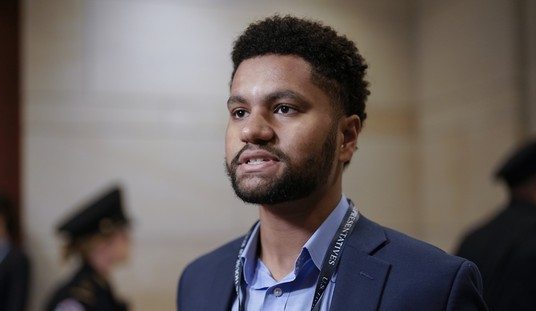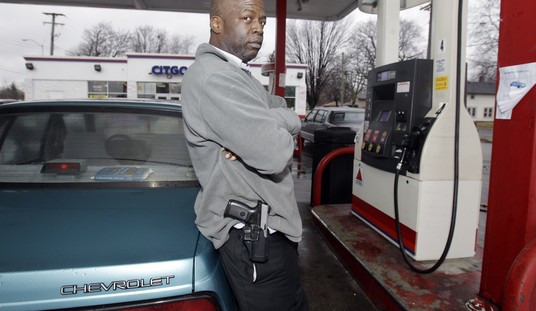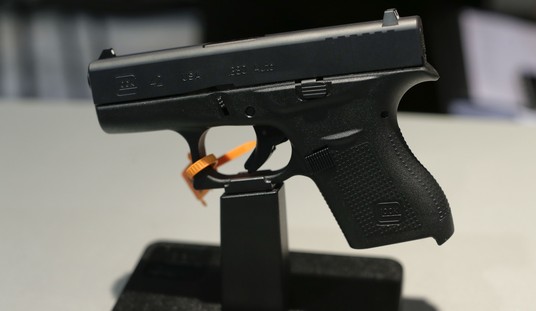While we all debate whether protesters are “rewriting history” when they tear down statues of Confederate leaders, or if they’re merely adding a new chapter to American history with their actions, there is no doubt that some anti-gun advocates are doing everything they can to present a false and misleading portrayal of the reasons for the Second Amendment, as well as erasing the experience of black Americans who’ve used firearms in self-defense out of our nation’s history.
At The Hill, political scientist and college professor Katie Scofield falsely claims that not only are armed citizens currently using the Second Amendment to “undermine democracy and individual rights,” but she argues that the entire reason for the right to keep and bear arms was to provide protection for white Americans against their slaves.
During debates regarding the ratification of the Constitution, some anti-federalists took particular notice of Article 1 Section 8 of the Constitution. The offending passages give Congress the “authority” to “call forth” and “train” militias.
At the time, Southern slaveholders worried that since the federal government was given power over the militias, Congress could eventually block southern states from using their militias to put down slave rebellions.
The full text of the Second Amendment states: “A well-regulated Militia, being necessary to the security of a free State, the right of the people to keep and bear Arms, shall not be infringed.” It is not an accident that James Madison, a slaveholder himself, mentions the need for states to have militias in the Second Amendment.
In order to make her case, Scofield has to ignore the fact that the push for the inclusion of a right to keep and bear arms in a Bill of Rights didn’t only come from slave states. In fact, some of the loudest calls for what would become the Second Amendment came from states where slavery had already been abolished, like New Hampshire, as I pointed out here not long ago.
In 1783, New Hampshire passed a law to abolish slavery in the state. Four years later, during the ratification debates over the proposed Constitution, the state’s constitutional convention proposed an amendment to the document.
Until that point, the Federalists had argued that, since the federal government would have only limited powers, a bill of rights was unnecessary. However, the New Hampshire convention then proposed one, including a guarantee that “Congress shall never disarm any citizen, unless such as are or have been in actual rebellion.”
Other states that had already moved to abolish slavery, including Vermont and Massachusetts, also had debates and discussions about the need to protect the pre-existing right to keep and bear arms in the U.S. Constitution.
Ratification conventions demanded a bill of rights when the federal Constitution was proposed in 1787 without one. In the Massachusetts ratification convention, Samuel Adams proposed “that the said Constitution be never construed to authorize Congress, . . . to prevent the people of the United States, who are peaceable citizens, from keeping their own arms . . . .” In the Pennsylvania convention, the Dissent of the Minority demanded a written bill of rights, including the proposal:
“That the people have a right to bear arms for the defense of themselves and their own state, or the United States, or for the purpose of killing game; and no law shall be passed for disarming the people or any of them, unless for crimes committed, or real danger of public injury from individuals…”
Sadly, Scofield ignores all of that history in favor of a simplistic and patently untrue version of American history that proclaims that, if not for slavery, Americans wouldn’t have a Second Amendment right to keep and bear arms at all. That’s bad enough, but she then compounds her error by asserting that the right to keep and bear arms has “historically been a tool of the oppressors rather than the oppressed,” adding that “it is time to let go of the myth that the Second Amendment is an effective tool for protecting individual liberties.”
Scofield’s myopic perspective that “guns are bad” blinds her and her readers to a fundamental truth about American history: black gun ownership has played a vitally important role in the quest for equality from almost the day that the Bill of Rights was ratified through our own tumultuous times. The idea that the Second Amendment is not an effective tool for protecting individual liberties would be laughed at by men like Hartman Turnbow, who defended his family from a Klan attack with the help of his rifle. When asked afterwards how he could justify using a firearm while preaching non-violence, Turnbow explained “I wasn’t being non-nonviolent. I was just protecting my family.”
What would Scofield say to Fannie Lou Hamer, the famed civil rights activist who said of the segregationists in Mississippi “Baby, you just got to love ’em. Hating just makes you sick and weak.” It would be easy for Scofield to nod in appreciation of Hamer’s words, but how would she react to Hamer’s statement that she kept “a shotgun in every corner of my bedroom and the first cracker even look like he wants to throw some dynamite on my porch won’t write his mama again”?
Even Martin Luther King, Jr. recognized the value of the right to keep and bear arms, stating “Violence exercised merely in self-defense, all societies, from the most primitive to the most cultured and civilized, accept as moral and legal. The principle of self-defense, even involving weapons and bloodshed, has never been condemned, even by Gandhi… When the Negro uses force in self-defense, he does not forfeit support. He may even win it, by the courage and the self-respect it reflects.”
One example of that respect earned by acting in self-defense can be found in one of our nation’s most shameful acts of racial violence: the Tulsa Race Riots of 1921. Ninety-nine years ago this month, the streets of Tulsa exploded with rioting, shooting, and wanton acts of destruction after a black man named Dick Rowland was accused of impropriety for touching the arm of a woman after he stepped on her foot in an elevator. The woman declined to press charges and the case was dropped, but when a mob of armed white citizens clashed with a group of armed black citizens intent on protecting Rowland from the lynch mob, the fighting raged for days, left hundreds of Tulsans injured, an unknown number of people killed, and large swaths of city’s black neighborhoods burned to ashes.
As Nicholas Johnson notes in his book Negroes and the Gun: The Black Tradition of Arms, in the wake of the Tulsa riots that destroyed much of the black part of town and left thousands of lives forever changed, something happened that sounds exceedingly strange to us today. Johnson quotes black historian John Hope Franklin, who moved to Tulsa as a child a few years after the riots and later “observed that the black community viewed the 1921 riot as a manifestation of their courage, and as a lesson about the proper response to racist aggression.” Tulsa’s black residents, according to Franklin, saw the riots as less of a story about black victimization, and instead viewed it as a heroic tale of standing up to oppression.
“The self-confidence of Tulsa’s Negroes soared, their businesses prospered, their institutions flourished, and they simply had no fear of whites. After 1921, an altercation in Tulsa between a white person and a black person was not a racial incident, even if there was a loss of life. It was just an incident. Such an attitude had a great deal to do with eradicating the fear that a Negro boy growing up in Tulsa might have felt in the years following the riot.”
If Scofield could go back in history, would she lecture the black residents of Tulsa and tell them that they were wrong to be proud of those who fought back when their homes and businesses were firebombed and their neighbors were shot down like dogs in the street? What would she make of the fact that black residents shooting in self-defense may have actually made life a little more tolerable in the aftermath of the riots?
Guns are inanimate objects. Wielded by an oppressor, they can be tools for oppression. Wielded by the oppressed, they can be tools for self-determination, individual liberty, and the fundamental right to life. Scofield’s warped history of the Second Amendment has room for villains, but no room for heroes like John Fletcher, who defended his new home from a mob shortly after he moved into an all-white neighborhood in Detroit in 1920, or Leola Blackmon, who protected her home in Carroll County, Mississippi from cross-burning Klansmen in the 1950s with the help of her 16-shot Winchester repeating rifle.
According to Scofield’s point of view, Leona Blackmon, John Fletcher, Fannie Lou Hamer, Hartman Turnbow, and countless others who exercised their Second Amendment rights in self-defense should have been advocating for gun control laws instead. Never mind that those laws would have likely been used to disarm them while their white neighbors kept ahold of their arms with a wink and a nod from law enforcement. Ida Wells was apparently wrong when she said that the Winchester repeating rifle deserved a place of honor in every black home as an anti-lynching tool. Based on Scofield’s view of history, she really should have encouraged her readers disarm themselves instead of arming up to fight back against the lynch mob.
Were these incidents of individual self-defense, and many more like them, enough to curtail the abuses that black Americans were subjected to by individuals, the mob, and even the State? No, and for Scofield apparently that’s reason enough to erase them from history. The reality is, however, that the right to keep and bear arms for self-defense has played an instrumental role in advancing the cause of equality and liberty for all Americans. To deny that is to deny history, and that in turn denies us the knowledge of countless Americans who used their Second Amendment rights in defense of themselves, their families, and their communities. These individuals aren’t just black heroes. They’re American heroes, and their stories should be taught instead of forgotten.









Join the conversation as a VIP Member